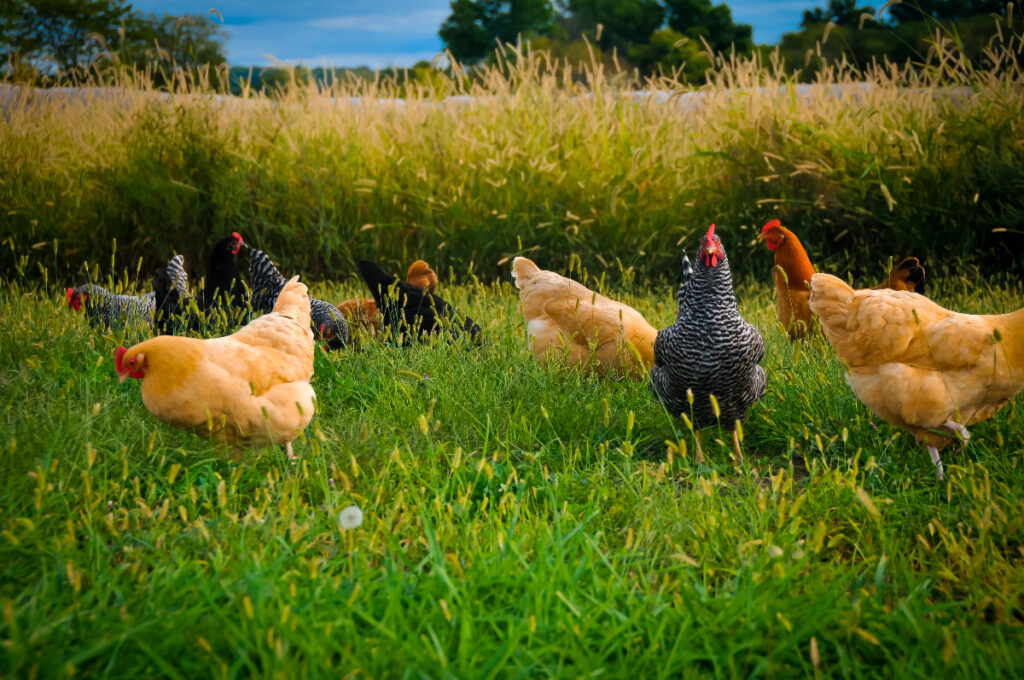Farm fresh eggs are a real treat, and there’s nothing like them for breakfast and baking. If you’ve ever visited our farm, you know that we take great pride in our eggs. Not only are they beautiful, but they’re also some of the tastiest eggs you’ll find!
Today I wanted to tell you about our eggs and how we produce them. We’ll also share a few storage tips to help you keep your eggs fresh.

Our Flock
We have a small flock of backyard chickens, and we are thrilled to be able to offer a limited amount of excess eggs for sale. When they’re not laying eggs in their big nest boxes, our hens are free, ranging in the untreated pasture, roosting under beautiful blue skies, scratching in green grass for bugs, or dust bathing by tall shady trees.
Our flock comprises several breeds, including Orpingtons, Light Brahmas, Marans, Ameraucanas, and Australorps.
While the hens are happy to spend their days foraging, the flock’s diet is supplemented with a balanced nutritious feed full of whole grains and beneficial ingredients, including our protein-rich farm-grown alfalfa and corn that we grind ourselves. The chickens are fed mealworms for extra protein, vegetable scraps, and herb clippings directly from our fields. They are offered fresh drinking water enhanced with probiotics and apple cider vinegar.

What You Should Know About Our Eggs
There Are Fewer Eggs Available During Winter
Many hens stop or slow down egg production during the fall and winter—the lack of daylight and cooler temperatures signal their bodies that it is time to rest. I prefer to follow the natural rhythms of the hen’s cycles and allow the hens during the winter months to use their energy to keep warm and let the chickens’ bodies to rest and recuperate.
We do not use commercial tricks to increase egg production during winter.
This results in fewer eggs available for sale, but the available eggs are of the highest quality, with firm yolks and bright orange-yellow hues.
Unwashed vs. Washed Eggs
Freshly laid eggs have a protective layer called a bloom or cuticle, which coats the egg’s surface. This final invisible layer of the egg shell protects and seals the egg from oxygen and bacteria. Commercially produced eggs are all washed before sale. This process removes the bloom and drastically decreases the shelf life of the eggs.
Washing eggs removes the protective bloom and allows oxygen and bacteria to enter the porous egg shell.
I wash only eggs if soiled (using just lukewarm water). I don’t differentiate between eggs that have been washed and those that haven’t. So, I refrigerate all of our eggs once they’ve been packaged. Once eggs have been refrigerated, they need to continue to be stored that way.
How to Store Your Farm Fresh Eggs
The best way to store your eggs is in the refrigerator in the carton with the pointy side of the egg. Eggs can be stored this way for up to three months. I mark my cartons with the date the eggs were laid and collected. But if you’ve lost track of how long the eggs have been in your refrigerator, you can do a simple test to determine the freshness of your eggs.
To test the freshness of your eggs, fill a bowl with cold water, put your eggs in there, and watch if they sink or float. If they float to the top, they are old and should be discarded. If they sink to the bottom, they are fine to eat. And if they stand up on their end from the bottom of the bowl, they aren’t super fresh but still fine to eat.
Eggs in Pretty Shades of Brown, Green, and Blue??
When you first get fresh farm eggs, you may notice that they are of different sizes and colors. This is perfectly normal! The chicken’s breed determines the egg shell’s size and color. Our flock contains several brown egg layers and a few green and blue egg layers!
The egg shell’s color does not affect the egg’s flavor or quality. Other than appearance, there are no major differences between eggs from different breeds of chickens, as noted on the University of Illinois Extension’s Incubation and Embryology site.
Blood Spots in the Eggs
When it comes time to use your fresh eggs, crack them into a clean bowl or container. If you notice a small red or brown spot on the yolk. This is called a blood or meat spot and is caused by a rupture of one of the eggs’ tiny blood vessels during formation. These spots are completely harmless, but if they bother you, you can remove them with the tip of a knife.
Hard Boiled Fresh Eggs
If you want a hardboiled egg, the cooking method for a fresh egg is a little different than a store-bought egg. The fresher the eggs, the harder they are to peel.
If you’ve ever had trouble peeling our boiled eggs, we highly recommend either letting our eggs age for a week or two in your fridge or using a steam cooking method. Steaming an egg yields the same result as boiling but with the benefit of shells that are much easier to remove.
The steam cooking process is easy. You can use an Instant Pot to steam your eggs in a pressure cooker or purchase an inexpensive egg cooker to perfectly steam your eggs in around 12 minutes.
Once you buy farm-fresh eggs, you won’t want to return to store-bought eggs. They taste better and are often better for you. You’ll often notice the yolk of a home-raised, free-range chicken a much brighter color than a store-bought egg.
We hope you’ll enjoy our farm-fresh eggs as much as we do! If you have any questions about storage or cooking, please don’t hesitate to reach out. We’re always happy to help!

